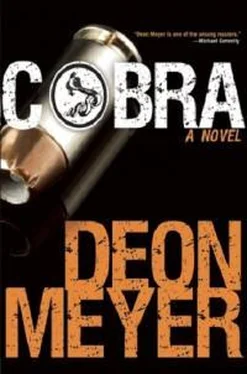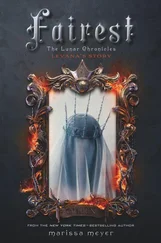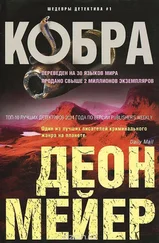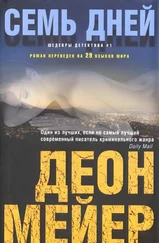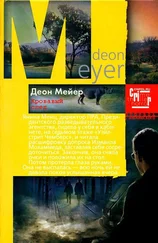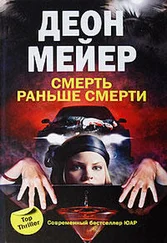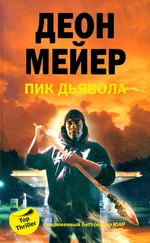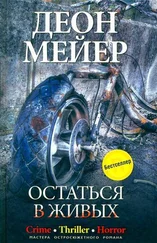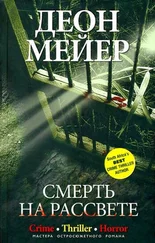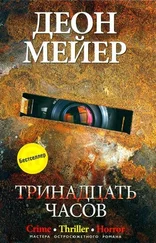He couldn’t understand what game she was playing.
‘Are you there?’ she asked.
‘Wait,’ he said, and dug the iPhone’s earphones out of his pocket, plugged them in, before he drove again.
‘I will lose my job if I investigate the case.’
‘They won’t know.’
‘Now who is “they”?’
‘I work for them. But I don’t share their agenda. Please.’
‘I don’t trust you.’
‘That I can understand. Ask me anything.’
‘What are you doing at SSA?’
She hesitated. ‘You drive a hard bargain.’
He didn’t answer.
‘I am head of the monitoring programme.’
‘And eavesdropping on us.’
‘Yes.’
That was why she could phone. ‘What is your name?’
Again a silence. Then: ‘Janina.’
‘And your surname?’
‘Mentz.’With a sigh of resignation.
Janina Mentz. Joni Mitchell. The same initials. Not very original. ‘Why does the SSA want us off the case?’ he asked.
‘I can’t put my head on a block, you must understand that. I am senior management, but not part of the top management, I don’t have access to all the information. But I have a theory, based on a strong rumour doing the rounds. That Adair wanted to embarrass the British government. Two years ago he published a memorandum on the Internet in which he said a new version of his algorithm could expose a whole string of dodgy bank transactions, and that Britain and the USA had a moral obligation to implement it . . .’
‘The Adair Protocol,’ said Griessel.
She remained quiet for a moment. ‘I underestimated you. I won’t make that mistake again.’
‘Go on,’ he said.
‘We suspect that he deployed this new algorithm on the SWIFT system without sanction. We suspect he gained access to information in this way about corrupt activities of British parliamentarians, of much greater scope than that which was already known. Bribe money from media interests, from weapons manufacturers, from interest and pressure groups. Large amounts in Swiss bank accounts. And it goes up to very high levels. Up to the cabinet. Then he tried to blackmail the British government. Something like “use the Protocol to fight organised crime, or I’ll make this public”.’
‘It still doesn’t explain why the SSA wants to take over the investigation.’
‘If we can get Adair, Captain, we can get all that information. And in the diplomatic sphere, that has incalculable value. You know that the British Department of International Development wants to halt their financial support to South Africa in 2015?’
‘No.’
‘Our government is very unhappy about that. And that sort of information could definitely make the Brits reconsider.’
He mulled over this for a moment.
‘OK. But what is your agenda?’
‘Are you familiar with the Spider-Man-principle?’
‘The what?’
‘The Spider-Man-principle. With great power comes great responsibility. That sort of information would give our government great power, Captain. I don’t think our government can be trusted with such great responsibility.’
32
Under normal circumstances Tyrone Kleinbooi liked Bellville Station. It reminded him of Uncle Solly’s stories about District Six – the mengelmoes of people and colours, the hustle and bustle, the music blaring out, competing from every point of the compass, the aromas of food stalls and takeaway cafés wafting at you as you walked by. His favourite clothing store just around the corner, in Durban Road: H. Schneider Outfitters. A continental name. And Outfitters . The sound of sophistication, just like their pinstriped suits and shoes and colourful waistcoats. And there, on the square at Kruskal Avenue and among the informal traders’ stalls in the alleyways and malls, you found more characters and shysters per square metre than any other place in the Cape. Look any which way and there’s counterfeit brand clothing and accessories from China, so much of it, such a racket, that you couldn’t even take a picture. If you took out your phone to snap something, the stall owners were on to you at once, ‘No, brother, please, no photos.’ They asked nicely, but there was a vague, veiled threat behind it.
It was no place for his industry – mostly poor and lower-middleclass moving through here – for him it was a place to relax, to check things out, to shoot the breeze. Because the other great feature of the station was that you almost never saw a policeman here. He had already worked it out for himself: law enforcement turned a blind eye to all the counterfeit, and probably also the stolen goods, because there’s no serious crime here. Maybe because everyone was in transit, and there weren’t kwaai valuables to steal. Perhaps because all the shysters and counterfeit traders looked out for each other, did their own policing.
So the cops don’t scratch where it doesn’t itch, and they don’t bother you here.
Which was a good thing right now.
Logic told him the cops were already looking for him. A nationwide manhunt, for the fugitive from the Waterfront killings. Tomorrow morning his face would be on all the front pages, but now his CCTV star appearance was probably a Kodak moment in every policeman’s breast pocket.
Here he didn’t need to worry about it. He could just look for helpers. And that was where his trouble lay. It wasn’t going to be easy. There were a few coloured businessmen, mainly in the Bellstar Junction in front of the station. Rich cats, they weren’t going to do any monkey-business for a brother for just a few hundred rand. The Nigerian money-changers and drug dealers were also a no-go area. They had the good taste to make themselves invisible in small apartments on the second and third floors of the buildings in the area. And they didn’t come cheap either.
But mostly, on the ground, it was all Little Somalia here.
And your trouble with Somalians is that they’re cat-footed. They tread warily. Because of the xenophobic attacks. And the fact that so many of them are illegal aliens. They don’t trust anybody except fellow former countrymen. You see it in their sceptical Somalian eyes. If you didn’t buy anything at his stall, if you loitered, or you came to gooi a scheme, then they checked you out doubtfully, talk about under suspicion . And the shake of the head came early on, no, no thanks, not interested.
But he had better get an assistant quickly. Because his time was running out. It was twenty past two.
Griessel told Janina Mentz to text her number to him. He would think everything over and phone her back. Then he rang off, and he switched off his phone, and drove to Stellenbosch by the Bottelary Road, because it was easier to spot a tail on that route.
And when he crossed the R300, his eyes constantly checking the rear-view mirror, the whole situation crashed down on him. Not gradually, but with a sudden, crushing weight.
And with it, as always, like a whirlwind, the thirst for booze descended on him: he instantly felt the smooth, cool weight of a glass in his hand. Short. Neat. No ice. No mixer, just the raw, rich taste of Jack Daniel’s on his tongue, and the heat down his throat. He shivered and gripped the steering wheel; his body craved the tingle of alcohol, now . ‘ Jissis ,’ he murmured. His mind told him there were places he could go, here in Kraaifontein, shebeens and a few bars, and nobody would even know.
But what about Nadia Kleinbooi?
Just a quick stop. Five minutes. Brackenfell or Kuils River, it was just a little detour, two lightning doubles, line them up, barman. Christ, the bliss that would flow, slip, slide through his veins and fibres to the deepest reaches of his body. Only two, they would heal him, of everything, they would last him till tomorrow, and tomorrow everything would be better again.
Читать дальше
